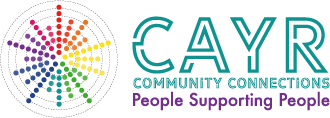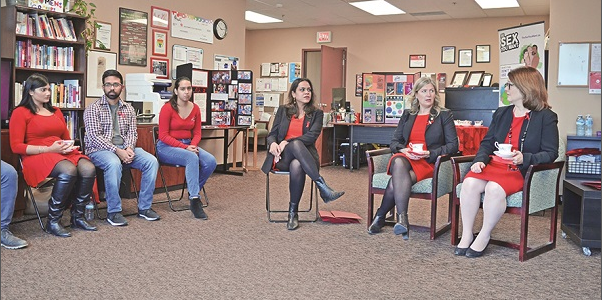In recognition of World AIDS Day 2018, a discussion was held around the need for harm reduction practices with Aurora-Oak Ridges-Richmond Hill MP Leona Alleslev & Markham-Stouffville MP Jane Philpott, Canada’s Minister of Indigenous Services and former Federal Minister of Health in January. The discussion was reflected in The Auroran below.
By Brock Weir
The sheer size of York Region – not to mention the Region’s diversity – can often make it challenging for support workers within the area to meet the needs of the community, but the Region needs to step up and provide resources to reduce existing gaps in harm reduction.
This is the message members of the AIDS Community of York Region delivered to Federal representatives [in December] as part of World AIDS Day.
Donning the red and black suitable for the international observance, Aurora-Oak Ridges-Richmond Hill MP Leona Alleslev was joined at the Committee’s offices in north Richmond Hill by Markham-Stouffville MP Jane Philpott, Canada’s Minister of Indigenous Services and former Federal Minister of Health, to hear concerns of outreach workers that have been informed by experiences in the field.
The two Members of Parliament joined a talking circle comprised not only of AIDS Committee staff and Board members, but also community partners and friends, to specifically discuss local and provincial challenges, along with opportunities, when it comes to HIV/AIDS prevention, testing and treatment across York Region.
Chief among their concerns were a lack of resources surrounding harm reduction, which encompasses the distribution of safer sex information, including the distribution of condoms, needle exchanges, providing food and clothing, along with shelter and sleeping bags to homeless members of the York Region community, along with providing health care information, counselling, and referrals to at-risk individuals.
“We see a lot of long-term survivors in this Region,” said Megan McGrath, Manager of Support Services for the Committee. “We see a lot of newcomers, immense diversity, which brings its unique challenges and joys. I would say the biggest challenges thus far have been geographic. It is a very large and diverse region, so there is a lot of people coming from very different places, travelling long distances to access services not only within York Region but outside the Region.
“A lot of our folks have historically accessed services in Toronto, because they are quite accustomed to that, they continue to access services in Toronto. Sometimes that is because they don’t exist in our region and sometimes that is because what is familiar and what feels safe for them. To have resources available to them to access the services they want to access is really, really important to us as an agency.”
But there are those gaps in harm reduction which, she said, leaves the Committee without the resources to “reach folks who are using substances in the Region.”
“Currently there are a number of people and populations who are at risk of contracting HIV or are living with Hepatitis C who we are not funded currently to assist, which is really important because we don’t want to wait until those folks end up being positive for us to be able to offer them resources,” she said. “We want to be able to offer resources now.”
This was a view bolstered by Vibhuti Mehra, the Committee’s Executive Director who also steers the Harm Reduction Coalition of York Region.
“There is no detox centre, no place for me to access treatment if I am having that moment where I want to help myself [and] I have to think about going to Brampton and I cannot get there,” said Ms. Mehra, adding more outreach workers were needed, as well.
“Public health is not really out in the street and they are not necessarily the most accessible people. We can’t know about those narratives unless we meet the people and someone has to meet the people and they are out in the streets, they aren’t going to come into a clinic, they aren’t going to walk through our doors. They are not necessarily aware of what is available or have the resources to come up here.
“We have to go where people are. I worry that is going to be a baggage we’ll deal with much later. Harm reduction is our value. We don’t want to wait for someone to have an overdose or even contract HIV because they didn’t know a safer way of using.”
In response, Ms. Philpott told the assembled circle that there is “such a struggle” to provide services and care for people in the Region, an issue which she identified as a practicing physician in Stouffville. She said she believed there are “more gaps than any of us really understand” because they are difficult to quantify with accurate data.
“In terms of harm reduction, I would love to have more conversation on what opportunities there are and what we [might be able to do] through our offices to link you into some potential opportunities,” she said. “I just think on injection drug use in the country I don’t need to tell you guys how critical it is that we in York Region get ahead of the challenges that the country is facing widely and I think one of the nice things about not having much established is it allows you to be maybe a bit creative. There are not established patterns on how we amplify the opportunities and I love your views on trying to get the resources to where people are.”






